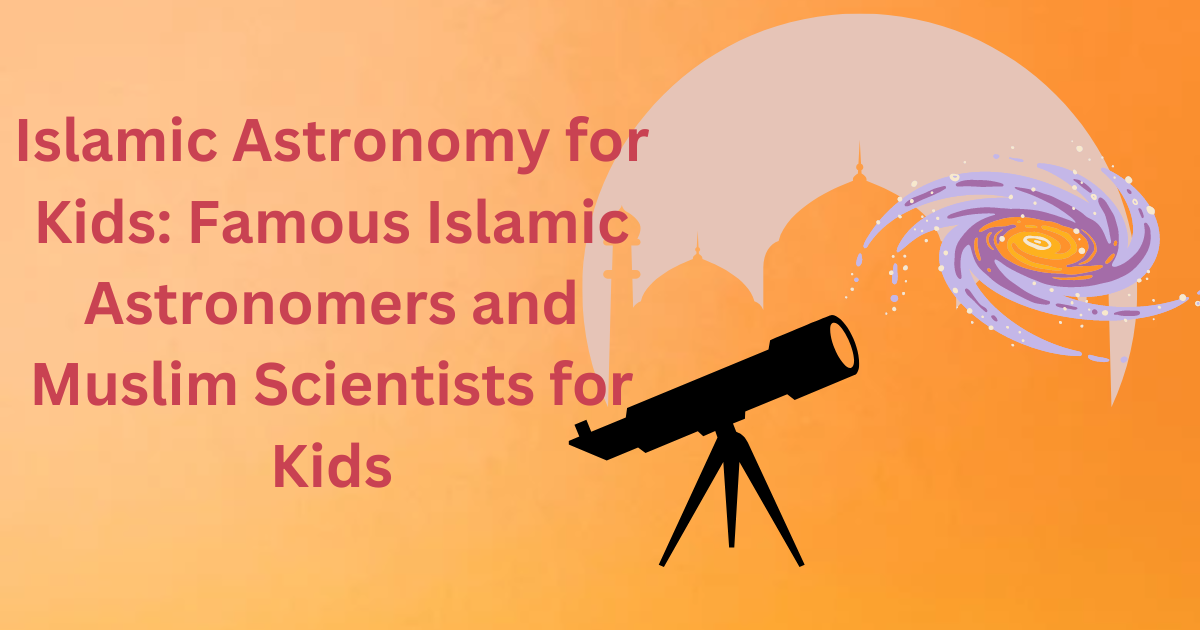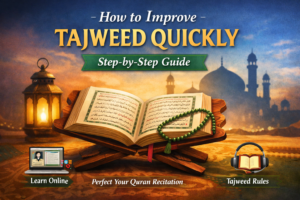Embark on a cosmic journey with Islamic astronomy for kids, where young explorers uncover the hidden gems of the universe through the eyes of legendary Muslim scholars. Imagine gazing at the stars, knowing that centuries ago, brilliant minds like Al-Battani and Ibn Yunus mapped the heavens and made groundbreaking discoveries that still guide us today.
This adventure isn’t just about planets and stars—it’s a voyage into a rich heritage, where science and faith intertwine, inspiring kids to dream big and reach for the stars, just like their ancestors did.
It’s of great importance to help kids uncover how amazing discoveries about the universe were achieved by Muslim scientists and how these findings influenced the development of the modern world. You and your kid will be astonished by the relationships between faith, science, and the cosmos.
In this article, we will talk about the meaning of astronomy, the most famous Islamic astronomer and the father of astronomy in Islam. We will also discuss how astronomy has been used in Islam, Islamic astronomical inventions, famous Islamic astronomers, some Islamic astronomy for kids books, and Muslim scientists for kids.
Table of Contents
What is Islamic Astronomy?
Islamic astronomy refers to the study and development of astronomical knowledge in the Islamic world from the 8th to the 14th centuries. This era is renowned for its significant contributions to various scientific fields, including astronomy. Muslim astronomers built on the knowledge of earlier civilizations, such as the Greeks and Indians, and made groundbreaking discoveries that laid the foundation for modern astronomy. Their work encompassed observational techniques, mathematical innovations, and the integration of astronomical knowledge with religious practices.
Islamic Astronomy For Kids
Islamic astronomy for kids is teaching young kids about the contribution of Muslim scholars in the field of astronomy and how these contributions have led to the advancements that led us to the moon.
Observing and studying everything from planets and stars to galaxies and the cosmos as a whole, astronomy is the scientific study of celestial objects and phenomena that originate outside the Earth’s atmosphere.
This is a science that has long attracted the attention of Muslim scholars. So Muslim astronomers used telescopes, satellites, and other devices to collect data and information about these objects. After that, they examine this data to discover more about their nature, manner of movement, and interconnected relationships.
Who Is The Most Famous Islamic Astronomer?
Al-Battani (850-929) is often considered the most famous Islamic astronomer. He was a brilliant mathematician and astronomer whose work significantly advanced our understanding of the universe. Al-Battani made incredibly accurate observations of the sky.
He was called the “Ptolemy of the Arabs” [Ptolemy was a prominent Greek astronomer]. Al-Battani made precise observations and calculations. He even corrected many of Ptolemy’s errors. He is considered to be the greatest and most famous of the astronomers of the medieval Islamic world.
His work on the length of the solar year and the precise calculation of eclipses was groundbreaking. He also created an equation for finding the Qibla (the direction that Muslims need to face during their prayers).
Who Is The Father Of Astronomy In Islam?
Ibn Yunus (950-1009) is considered the “Father of Astronomy in Islam”. He made highly accurate measurements of the Sun, Moon, and planets. His works are noted for being ahead of their time, having been based on accurate calculations and attention to detail.
He made significant contributions to the field, including highly accurate measurements of solar eclipses. His observations are considered so reliable that some of the thirty eclipses reported by him were used by Simon Newcomb [a brilliant Canadian-born American astronomer and mathematician] in the nineteenth century, in determining the secular acceleration of the moon.
The title “father of astronomy in Islam” is also often attributed to Al-Farghani (Alfraganus), a 9th-century astronomer who made significant contributions to the understanding of celestial mechanics.
The title “father of astronomy in Islam” is often attributed to Al-Farghani (Alfraganus), a 9th-century astronomer who made significant contributions to the understanding of celestial mechanics.
Al-Farghani’s Contributions
- Authored “Elements of Astronomy”: His book provided a comprehensive overview of Ptolemaic astronomy and was used as a reference in Europe for centuries.
- Clarified the Movements of Celestial Bodies: Al-Farghani’s work helped clarify the movements of the sun, moon, and planets, making astronomical knowledge more accessible.
Key Features of Islamic Astronomy
Islamic astronomy was marked by several key features that contributed to its remarkable achievements and lasting influence. Here is a summary of its key elements:
1- Advancements in Observational Techniques:
Islamic astronomers built sophisticated observatories and developed new instruments to observe celestial bodies with greater accuracy.
2- Translation and Preservation:
Many Greek and Indian astronomical texts were translated into Arabic, preserving and expanding upon the knowledge of previous cultures.
3- Mathematical Innovations:
Muslim scientists introduced new mathematical techniques to improve the accuracy of astronomical calculations, such as algebra and trigonometry.
4- Integration with Religion:
Astronomy was closely linked with Islamic practices, including the determination of prayer times and the direction of Mecca (qibla).
5- Development of Astronomical Tables:
Islamic astronomers created detailed astronomical tables that were used for navigation and timekeeping.
6- Construction of Instruments:
They invented and refined instruments like the astrolabe, armillary sphere, and quadrant to enhance their observations.
7- Establishment of Observatories:
Significant observatories were built in cities like Baghdad, Cairo, and Maragheh, serving as centers for astronomical research.
8- Geographical Measurements:
Accurate measurements of the Earth’s circumference and the distances between cities were conducted.
9- Celestial Mapping:
Detailed star maps and catalogues were created, documenting the positions and movements of stars and planets.
10- Scientific Writings:
Numerous treatises and books were written, documenting their findings and theories.
11- Educational Centers:
Institutions like the House of Wisdom in Baghdad played a crucial role in advancing astronomical knowledge.
12- Collaboration and Exchange:
Scholars from different regions collaborated, sharing their knowledge and discoveries.
How Was Astronomy Used In Islam?
In Islamic society, astronomy had a significant impact on many facets of life, and teaching kids about the connection between scientific astronomy and Islamic life will help them understand the deep relationship between science and Islam. Here are a few important applications:
1- Determining Prayer Times:
Accurate knowledge of the Sun’s and Moon’s positions was essential for calculating the precise times of daily prayers for Muslims.
2- Calculating the Islamic Calendar:
Astronomy was vital in determining the start of Islamic months, especially Ramadan, and religious holidays, the most important of which is the Day of Arafah, which is the 9th day of Dhu al-Hijjah, the twelfth and final month of the Islamic lunar year. The Day of Arafa determines the Hajj and is considered the Peak of Hajj.
3- Finding the Qibla:
The direction of Mecca (Qibla) for prayer was determined using astronomical observations and calculations. Using trigonometry, Al-Battani created an equation for finding the qibla. His equation was widely used until superseded by more accurate methods, introduced a century later by another prominent Muslim polymath: Al-Biruni.
4- Navigation:
Muslim traders and sailors used celestial bodies for navigation during their travels. Muslim astronomers studied the positions and motions of planets, stars, and other celestial bodies with great care. This information was essential for figuring out the longitude and latitude.
5- Timekeeping:
Muslim astronomers developed complex timekeeping instruments to precisely measure time. By tracking the Sun’s movement across the sky, Muslim astronomers could determine the time of day. Sundials [a device that tells the time of day based on the position of the Sun in the sky] were widely used for this function. As for the night, observing the positions of stars and planets provided a more accurate method for timekeeping.
6- Agricultural Planning:
Muslim astronomers studied celestial cycles to forecast weather patterns, helping farmers plan their sowing and harvesting activities accordingly. Also, By observing the positions of the sun, moon, and stars, they could predict the onset of different seasons, including the rainy and dry seasons.
7- Scientific Advancement:
Far beyond Muslim astronomers’ contributions to navigation, agriculture, and timekeeping, their exploration of the cosmos laid the groundwork for many modern scientific disciplines.
For example, by calculating celestial distances and positions, Muslim astronomers developed and refined mathematical concepts, such as geometry, algebra, and trigonometry. These advancements had magnificent implications for fields like physics, engineering, and architecture.
Islamic Astronomy Inventions
Muslim astronomers created cutting-edge tools and methods, making substantial contributions to the field. Some of their noteworthy inventions are listed below:
1- Improvements of Instruments:
Realizing how important precise observation was, Muslim astronomers dedicated significant efforts to enhancing the already existing tools as well as inventing new ones. These discoveries opened up new areas of astronomical research and paved the way for later breakthroughs in science. Among the tools that they enhanced:
A- The Astrolabe:
Although invented by the Greeks, Muslim astronomers refined and perfected the astrolabe, making it a more accurate and versatile tool for measuring time.
An ancient instrument used to solve problems related to time and the position of the stars. Muslim astronomers refined and widely used the astrolabe for navigation and astronomy.
B- The Sextant:
It was an instrument used for measuring angles, primarily for navigation. While the sextant was not originally invented by Muslims, Muslim astronomers made significant improvements to it.
2- Other Contributions:
Muslim astronomers did not merely observe the heavens; they sought to comprehend the underlying principles governing astronomy. Their explorations were instrumental in shaping astronomical thought for centuries to come. For example, they had:
A- Observatories:
The establishment of observatories in cities like Baghdad and Damascus facilitated detailed observations and data collection about the universe.
B- Accurate Measurements:
Muslim astronomers were known for their precise measurements of celestial bodies, leading to improved astronomical tables and calendars.
C- Contributions to Planetary Theory:
They refined existing models of planetary motion and made original contributions to the understanding of celestial mechanics.
These discoveries and developments had a significant influence on disciplines like mathematics, physics, and navigation in addition to laying the groundwork for contemporary astronomy.
3- Armillary Sphere:
A model of objects in the sky, consisting of a spherical framework of rings, centered on Earth or the sun, that represent lines of celestial longitude and latitude and other astronomically important features.
Famous Islamic Astronomers:
Islamic civilization produced a large number of brilliant astronomers who made very important contributions to astronomy. Meeting these astronomers through pictures and words will help your kid foster a feeling of pride towards their heritage, and it can even inspire the little one to follow their footsteps into the realm of astronomy. Here are a few of the most famous of them:
1- Al-Biruni (973-1050):
A polymath, Al-Biruni was also a brilliant astronomer. He was called the “Father of modern geodesy”. He proposed that the Earth rotates on its axis and made accurate calculations of the Earth’s circumference. He was so much ahead of his time. For example. he defended the position that the universe had a beginning, which was argued about 9 centuries later by the Big Bang theory in the 20th century.
2- Ibn al-Haytham (965-1040):
Ibn al-Haytham was a medieval mathematician, astronomer, and physicist of the Islamic Golden Age. He was primarily known as a physicist and mathematician. He is referred to as “the father of modern optics”. He also made significant contributions to astronomy. His observations and theories about the celestial bodies have continued to shape our understanding of the universe today.
3- Abd Al-Rahman Al-Sufi (903-986):
He created a detailed star list. He made corrections to Ptolemy’s star list and made accurate estimations of star brightness.
4- Nasir al-Din al-Tusi (1201-1274):
Al-Tusi developed the Tusi couple, a geometric model that provided an alternative to the Ptolemaic system of planetary motion. His work influenced later astronomers, including those in the Renaissance period.
Islamic Astronomy For Kids Books:
There are many good quality books that teach kids about Islamic astronomy and famous Muslim astronomers. We can see below two examples of books that are full of important pieces of information about astronomy for kids:
1- “Ibn Yunus: The Father of Astronomy” by Ahmed Imam:
This book is as small as 24 pages, in English, with attractive illustrations. It introduces kids to Ibn Yunus, “The Father of Astronomy” and his great achievements in the field.
2- “Night of the Moon” by Hena Khan:
This is a very interesting tale-like book for kids. With its beautiful illustrations of Islamic art, it offers a nice glimpse into modern Muslim culture as it tells the story of a seven-year-old Pakistani-American girl who celebrates the Muslim holidays of Ramadan and Eid.
Muslim Scientists For Kids:
Imagine a world without algebra, optics, geography, or modern medicine. It’s hard to imagine, right? We have many outstanding Muslim scholars to thank for these extraordinary advancements! As a parent, you can tell your kid about some of our great Muslim scientists who have changed the face of science and history. Let’s meet just five of them:
1- Ibn Sina (Avicenna):
Ibn Sina is often called the “Prince of Physicians”. He wrote a massive medical encyclopedia. His book, “The Canon of Medicine” was used for centuries to teach doctors. He also made important discoveries about diseases and their treatments.
2- Ibn al-Haytham:
Ibn al-Haytham was a pioneer in Optics. His most famous work, “Kitab al-Manazir” (Book of Optics), revolutionized our understanding of vision and light. He conducted experiments using a camera obscura, a precursor to modern cameras and developed theories about the nature of light, reflection, and refraction.
3- Al-Khwarizmi:
Al-Khwarizmi is the “Father of Algebra”. His work on numbers and equations is still used in math today. He also helped develop the number system we use. The very word “algorithm” came from his name; as he was a pioneer in creating algorithms. All of today’s computers and smart devices are mainly based on algorithms. This shows how great he was.
4- Jabir Ibn Hayyan:
Jabir Ibn Hayyan is often called the “Father of Chemistry”; because he discovered so many important things about how chemical substances work together. His works contain the oldest known systematic classification of chemical substances, as well as the oldest known instructions for deriving an inorganic compound from organic substances (such as plants and blood) by chemical means.
5- Ibn Battuta:
Ibn Battuta was a brave explorer who loved to travel to far lands and meet new people. He visited many different countries and wrote about all his adventures. This incredible explorer’s adventures were depicted in his book “Al-Rihla”. It is an account of his great travels to different parts of Africa and Asia. Please see below a depiction of his travels, from Morocco, and then back to Morocco where he died.
These are just a few examples of the incredible contributions made by Muslim scientists. They were smart, curious individuals who cherished learning and exploration.
Learn the Quran Online With Bayan al-Quran Native Arab Tutors:
Embark on a transformative journey of Quranic learning with Bayan Al-Quran’s comprehensive online courses. Our platform offers an authentic and immersive experience tailored to learners worldwide. Whether you’re a beginner or seeking to enhance your skills, our Tajweed courses provide expert guidance and structured learning to master the art of Quranic recitation.
🎓 Expert Guidance:
Benefit from experienced instructors who specialize in Tajweed, breaking down complex rules into manageable segments for learners of all levels.
✨ Key Features:
Structured, step-by-step learning approach.
Access to high-quality instructional materials.
Real-time feedback from qualified tutors to enhance your practice.
Flexible learning schedules to accommodate your pace and convenience.
Immerse yourself in the melodious tones of Quranic recitation, enriching your spiritual experience.
🌟 Why Choose Bayan Al-Quran?
Join our vibrant community dedicated to perfecting Quranic recitation. Build a profound connection with the divine words of the Quran and enrich your spiritual journey. Choose Bayan Al-Quran for a transformative learning experience and embark on a path to mastering Tajweed with confidence.
You can also attend online Quran Classes with Bayan al-Quran with Native Arab tutors. There are also several courses that can help you in this regard.
Conclusion
In conclusion, teaching Islamic astronomy for kids is more than just imparting knowledge about stars and planets—it’s about connecting young minds to a rich legacy of scientific exploration. By learning about the contributions of Muslim scholars like Al-Battani and Ibn Yunus, children gain a deeper appreciation for the advancements that have shaped our understanding of the universe.
Muslims have long been fascinated with the heavens, believing that studying the stars and planets may help one comprehend Allah’s marvelous creation. Muslim astronomers were pioneers in exploring the universe, producing astounding findings that had a profound impact on the world today.
This knowledge not only instills pride in their heritage but also inspires them to continue exploring the wonders of the cosmos, just as their ancestors did centuries ago.
So, the next time you gaze up at the stars, keep in mind the outstanding Muslim minds who have contributed to our understanding of the universe today. You might end up being the next big astronomer, who knows!


















